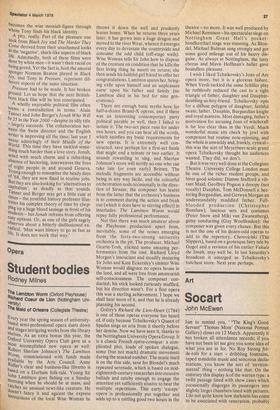Pera
Student bodies
Rodney Milnes
T_he Lambton Worm (Oxford Playhouse) 'Pilchard Coeur de Lion (Nottingham University) The Maid of Orleans (Collegiate Theatre) every year the spring season of universitybased semi-professional opera dusts down and stages intriguing works from the library shelves. As an extra bonus this year, the OXford University Opera Club gave us a
ost accomplished new opera as well: Kobert Sherlaw Johnson's The Lambion %rol, commissioned with funds made available by the Arts Council. Anne Rldler's clear and business-like libretto is based on a Durham folk-tale. Young Sir John Lambton goes fishing on a Sunday morning when he should be at mass, and catches an unusual newt-like creature. He oesn't fancy it and against the express Instructions of the local Wise Woman he
throws it down the well and prudently leaves home. When he returns three years later, it has grown into a huge dragon and moved to the river Wear, whence it emerges every day to devastate the countryside and consume the odd child (off-stage wails). Wise Woman tells Sir John how to dispose of the creature on condition that he kills the first living thing he meets on return; she then sends his faithful girl friend to offer her congratulations. Lambton spares her, bringing exile upon himself and an unpleasant curse upon his father and family (no Lambton died in his bed for nine generations).
There are enough basic myths here for half-a-dozen Brand-X operas, and if there was an interesting contemporary party political parable as well, then I failed to isolate it. The two-act piece runs for under two hours, and you can hear all the words, which satisfies my basic requirements for new operas. It is extremely well constructed, save perhaps for a first-act finale that might end a minute or two earlier. It sounds rewarding to sing,. and Sherlaw Johnson's score will terrify no one who can take late (or even early) Britten. The melodic fragments are accessible without being in any way facile, and the colourful orchestration nods occasionally in the direction of Strauss; the composer has learnt from the latter that the orchestra's business is to comment during the action and freak out (which it does here to stirring effect) in interludes. The Lambton Worm would repay fully professional performance.
Not that there was much amateur about the Playhouse production apart from, inevitably, some of the noises emerging from the forty-two-strong university orchestra in the pit. The producer, Michael Gearin-Tosh, elicited some amazing performances from the cast. Richard Lloyd Morgan's insouciant and steadily maturing Sir John and Kate Eckersley's sinister Wise Woman would disgrace no opera house in the land, and all were free from amateurish self-consciousness. The composer conducted; his stick looked curiously muffled, but his direction wasn't. For a first opera this was a sterling achievement. I hope we shall hear more of it, and that he is already planning his second.
Gretry's Richard the Lion-Heart (1784) is one of those operas everyone has heard
of, if only because Tchaikovsky's Queen of Spades sings an aria from it shortly before her demise. Now we have seen it, thanks to the Nottingham University Opera Group. It
is a classic French opera-comique: a complicated plot, loads of spoken dialogue,
some (but not much) dramatic movement during the musical number, The music itself is on the thin side, save for Blondel's much repeated serenade, which is based on mid
eighteenth-century researches into trouvere ballads and catchy enough to engage the attention yet sufficiently elusive to bear the
multiple repetitions. This early 'escape' opera is professionally put together and adds up to a rattling good two hours in the theatre — no more. It was well produced by Michael Rennison —his spectacular siege on Nottingham Great Hall's pockethandkerchief stage was stunning. As Blondel, Michael Bulman sang strongly and got some good mileage out of his heavy disguise. As always at Nottingham, the lusty chorus and Mavis Hoffman's ballet gave boundless pleasure.
I wish I liked Tchaikovsky's Joan of Arc opera more, but it is a glorious failure. When Verdi tackled the same Schiller play he ruthlessly reduced the cast to a tight triangle of father, daughter and Dauphindoubling-as-boy-friend. Tchaikovsky opts for a diffuse polygon of daughter, faithful swain, father, Dauphin, Burgundian knight and royal mistress. Most damaging, father's motivation for accusing Joan of witchcraft is far less clear than in the Verdi. Much wonderful music sits cheek by jowl with competent but routine note-spinning, and the whole is unwieldy and, frankly, cynical — this was the sort of Meyerbeer-scale grand opera Tchaikovsky thought his audiences wanted. They did, we don't.
But it was very well done at the Collegiate Theatre. University College London must be one of the richer student groups, and hires good soloists: Dianne Stafford a vibrant Maid, Geoffrey Pogson a droopy (not vocally) Dauphin, Tom McDonnell a hectoring Burgundian, and Gerwyn Morgan an understandably muddled father. Fullblooded production (Christopher Renshaw), luscious sets and costumes (Peter Snow and Miki van Zwanenberg), gutsy conducting (Guy Woolfenden): the composer was given every chance. But this is not the one of his dozen-odd operas to add to the repertory. Cherevichki (The Slippers), based on a grotesque fairy tale by Gogol and a revision of his earlier Vakula the Smith, may well be. In last Saturday's broadcast it emerged as Tchaikovsky's butchest score. Next year perhaps.


































 Previous page
Previous page